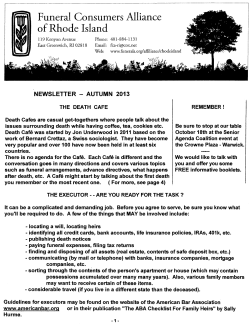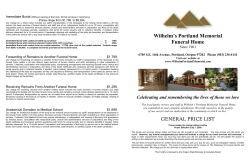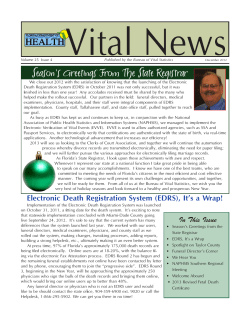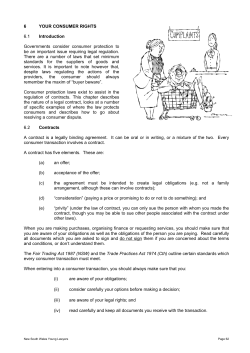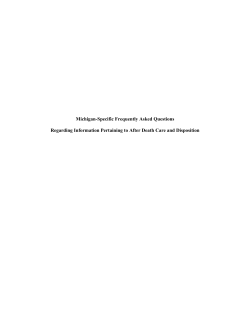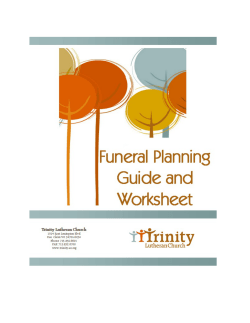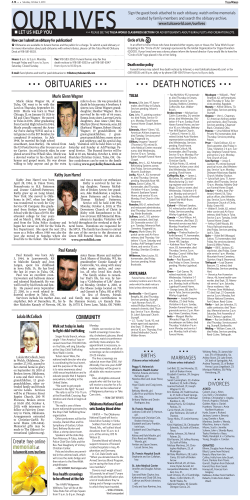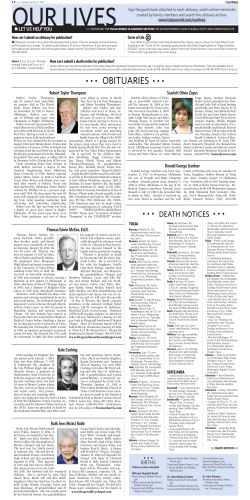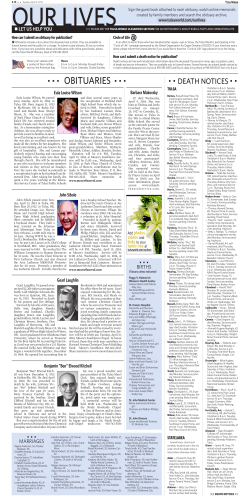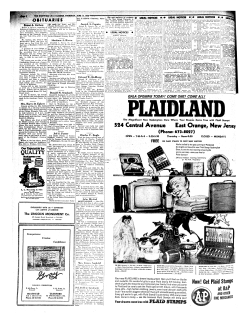
Funeral services
COUNSEL Funeral services Arranging a funeral is a very difficult task and something that many of us are simply not prepared for. We look at what is involved in planning and financing a funeral. Arranging and paying for a funeral is not commonly discussed for obvious reasons. It can be an uncomfortable topic of conversation and many of us may never even think about it until faced with the death of a loved one. Consequently, when the need to arrange a funeral arises, a lack of planning and information may result in some people paying more than necessary to cover the costs. Few people realise that the cost of a funeral at the higher end of the scale can run up to €10,000 when the coffin, the burial, the headstone, the catering and all of the added expenses such as flowers and newspaper notices are included. It is important to be very specific about the items you want included and to be AT A GLANCE Funeral costs. Keep it simple. Financial assistance. 90 consumer choice APRIL 2010 COUNSEL conscious of what you are being asked to pay. We need to question why prices are so outrageous and be willing to complain in order to prevent prices creeping even higher than they already have. Families are vulnerable at this time, which can leave them open to exploitation. This guide aims to clarify the different requirements that usually arise at the time of the death of a family member. We also investigate whether there are less expensive options available to those who simply cannot afford the so-called ‘average’ prices. Funeral costs In the UK, a report by the market research group Mintel found that the cost of dealing with a death has increased by 42% since 2005. The average cost, which includes the probate, the funeral and a headstone, is now more than £7,000. It can be hard to pin down the exact cost of a funeral in Ireland. Funeral directors are not under obligation to display their prices by law although members of the Irish Association of Funeral Directors (IAFD) are bound by their Code of Practice to do so. We found it difficult to obtain the figures we wanted in some cases. This led us to conclude that some families may not be fully aware of the potential costs when arranging a funeral, depending of course on who they deal with. Because there are no regulations on pricing policy and written estimates, abuses can CODE OF PRACTICE The Irish Association of Funeral Directors (see Useful contacts) is the undertaker industry's trade association. Members must follow its Code of Practice, which commits members to: • Discussing and agreeing the funeral director's charges with the next of kin in advance, unless expressly asked not to. • Professionalism and quality of service in arranging and conducting the funeral. • Openness about cost and payment. • Accurate advertising of prices and services. • Sensitivity, confidentiality and a commitment to leaving the customer in control of decisions. can be prepared for the bills once they arrive. Ask for a breakdown of the prices of specific items to be included. The charges generally include the removal of the deceased from the place of death for embalming, the coffin, the embalming of the body, the removal back to the residence or funeral home and the transport to the funeral. The charges also include the funeral director’s fees for arranging the funeral. If you are not happy with the cost there is nothing to say that you can’t look for a quote from a different undertaker. Disbursements and do occur. In the USA and Canada, funeral homes are required under law to give out their price list over the phone when asked. This law is there to protect consumers and to ensure that when they receive the final bill they will know what to expect. It may be difficult to ask for prices at the outset but a good funeral director will insist that the family receives a written quotation. As one funeral director we spoke to said; “If people have the sense to lay it on the line from the start, then they could be in a much better position to negotiate costs.” He added that, unless the family makes it clear that they have a budget which they want to stick to, they are more likely to pay the average prices rather than the lower prices that are in fact available if requested. Breakdown of costs When it comes to finding out how much a funeral will cost, it is important to realise that the two major expenses are those of the funeral director and those of the burial including the cost of purchasing a plot in a graveyard. Of course, the arrangements for every funeral will differ depending on the needs and wishes of the family. Other factors impacting on the cost include where the funeral is taking place, the day it takes place (sometimes there are extra charges for burials on Saturdays and Bank Holidays) and the type of coffin or casket that is chosen. Funeral director The funeral director, or undertaker, ensures that all the arrangements for the funeral and the burial or cremation are made in agreement with the deceased person’s wishes and the family. Many people choose the funeral director based on recommendations or on prior experience. Before contacting a funeral director, it is helpful to have an idea of what you need and of what your budget is. Request a written estimate of the total cost of the funeral at the outset so you Apart from the funeral director’s costs the disbursements are a big consideration. These are payments made to third parties by the funeral director on behalf of the bereaved family at the time of the funeral. They can include the purchase of a grave, grave opening, doctor’s and coroner’s fees, cremation fees, newspaper announcements, flowers, fees to organist/soloist and offerings to the Church. One funeral director we spoke to highlighted that some funeral directors omit the price of embalming from their fee and add it on as a disbursement instead. This is why it is so important to ask what is included at the start and not to presume anything. It would be more transparent if all funeral directors’ fees included the same basic services and this would make it easier to compare like with like. Competition One problem which was highlighted during our research is that it is very difficult for a new funeral director to start a business and this is stifling competition in the industry. COUNSEL APRIL 2010 consumer choice 91 financial assistance A Bereavement Grant is a once-off payment that may be available in the event of a death. Eligibility for the €850 grant is not based on ability to pay for the funeral but is dependent on PRSI contributions. It is payable on the death of a qualified person, or the spouse or child (under 18 or 22 if in full-time education) of a qualified person. A qualified person must have contributed at least 156 weekly (i.e. 3 years) PRSI contributions since entry into employment. The contributions do not have to be continuous payments. To get the application forms posted to you, phone LoCall 1890 20 23 25 or LoCall 1890 500 000, or ask for a form at your local Social Welfare Office, Post Office or Citizens’ Information Centre. The forms can also be downloaded from the internet at www.welfare.ie. This form must be completed and sent back with a copy of the death certificate and the funeral invoice, and must be in the name of the person making the application. In addition to the Bereavement Grant, a person may also be entitled to the Widowed Parents Grant for widows/widowers with dependent children or a Special Funeral Grant (under the Occupational Injuries Benefits scheme). Depending on your circumstances there may also be other social welfare payments. If the deceased person was claiming social welfare, the payments will usually continue to be paid to the surviving partner/carer for six weeks after the date of death if they are a named dependent/carer. Contact your local social welfare office for further information. In many local areas around the country there may be only one funeral home in operation. It is extremely difficult to get planning permission for a new one and it could cost over a quarter of a million euro to build a new one. Some existing funeral directors refuse to hire out their funeral home to others and this also helps to stifle competition. Price comparison Consumer Choice chose a number of funeral directors at random and contacted them to get information on their fees. At first, we asked for a breakdown of which services were included in their fee; these were quite similar across the board and included embalmment, provision of the coffin and of the hearse, advice on all arrangements and liaison with third parties. Most claimed that they could not break their fee down by the various services and said that it all depends on the family when they speak to them. However, this makes it difficult to make comparisons. We also asked about the lowest cost for which a funeral, excluding disbursements, could potentially be arranged. Once again, the response was that generally it was too difficult to say, and that it depended on a family’s requirements. We understand that it is difficult to give an estimated cost of a funeral but the scenario we posed was 92 consumer choice APRIL 2010 COUNSEL what the cost would be for a customer who simply could not afford to pay more than the basics. One funeral home in Carlow said a funeral could be arranged for €1,500 excluding disbursements, and another quoted €2,000, again excluding disbursements. However, we were asked not to identify the funeral homes. As one funeral director put it “We wouldn’t be advertising the fact that we can do it for this low.” One funeral director who operates in North County Dublin willingly sent us a complete breakdown of his costs. A one day funeral could be provided for €1,315 (excluding the coffin and disbursements), with the removal to the Church and the funeral on the same day. The traditional funeral with provision of the hearse for two days for the removal and burial would be €1,500. The most basic coffin would be €630 and this would be added to the fee to make a total of €2,130 before disbursements. In Co. Mayo we were told that a one day funeral could be arranged for less than €1,000 if embalming of the body is not necessary, while in Limerick the price of a one day funeral was quoted at €2,750 including the coffin. This also included the preparation of the body for viewing by the family although full embalmment would not be necessary for such a short funeral. Those funeral directors to whom we spoke in depth said that they would always work to help families decide on the most suitable level of service while keeping it within their means. Coffin/Casket The price of a coffin varies widely, depending on the style and size required by the family of the deceased. A very basic oak coffin can start from €550 but can rise to €2,000 and upwards. In America, people have the choice of buying their own coffin or casket from the wholesaler or online and having it delivered to the funeral home but in Ireland, funeral homes have their own catalogues to choose from. Traditional coffins often have plastics, varnishes and glues used in their construction but some companies in Ireland are now producing more environmentally friendly coffins made from materials such as bamboo, willow and wicker. Green Coffins Ireland Ltd is one such company that supplies eco-friendly funeral products (see www.greencoffinsireland.com). Burials In the past decade the shortage of space for burial plots in cemeteries has become a major problem and has made it very expensive to purchase a new grave plot. In fact the grave plot can prove to be the highest cost for people in urban areas whereas it may be minimal in rural parts of the country. Some burial grounds in Dublin, including Deansgrange and St Fintans (Fingal County Council) have no new graves available. In Glasnevin, the price starts from €1,850 while in Shanganagh (Dun Laoghaire-Rathdown County Council) the cost starts at €2,600. Graveyards are normally the responsibility of the local authorities so they should be the first point of contact for someone who wishes to purchase a grave. Even if a family already owns a plot, the local authority will charge a fee to open the grave. This can range from a minimal cost of €50 or €100 if local people are involved with running the graveyard (normally in rural areas) to over €900 in some of the graveyards in Dublin. One funeral director in Limerick said it had been announced that the price of plots was being dramatically increased by the council on the very day we spoke to him, in one graveyard by 47%. In the past, it was possible to prepurchase graves in many graveyards but this is not as common now because of the restrictions on space. We spoke to a representative of Newlands Cross burial ground where graves can still be prepurchased and they assured us that such graves will never be resold and would always be kept for the family that purchased the grave. However, we feel that this is something that you need to clarify if you decide to make such an arrangement. Cremation This practice is becoming more popular in Ireland, particularly since the Catholic Church began to allow it but also because of the high cost of new grave plots. There are crematoria in Glasnevin, Newlands Cross and Mount Jerome in Dublin, and at The Island in Cork. A service in a crematorium costs from €500. Prices for urns start from €40 but more expensive urns can be chosen by the family at a higher cost. The funeral director's charges are usually the same in the case of cremation but with a burial there is the additional cost of a grave and headstone and disbursements to factor in. The family of the deceased may want to inter ashes in a family grave or to disperse the ashes at a place of their choosing. Another option is for the ashes to be interred in a Garden of Remembrance at the cemetery. Some crematoria provide plaques with the name of the deceased and the date of death but these are normally purchased for a limited period only. Direct enquiries should be made to the crematorium to ensure that full details of your options are provided along with a price-scale. stressed that it is advisable that all bodies being waked at home should be embalmed and this should be done in a suitable premises. There is a concern that infection control procedures and standards can vary because of a lack of regulation. Although the Health and Safety legislation and Infectious Diseases legislation already in place are relevant, this report stressed the need for standards to be set and for specific regulation for the industry to be introduced. The Scientific Advisory Committee of the HPSC appointed a sub-committee to draw up guidelines for those involved in the handling of human remains which can be viewed on its website www.hpsc.ie. Keep it simple Funerals don’t have to be so costly, particularly if you are willing to cut out some of the extras. You can keep things basic but still organise a special service without running into financial difficulty when the bills arrive. Many costs which you may not have expected crop up during the days of the service and also in the aftermath of the funeral. Prepaid funeral packages are now being provided by many funeral homes for people who want to make sure their families are not left with the responsibility of covering all the costs incurred by the funeral. Bear in mind that the gravestone is another big cost that will arise in the first year after the burial. Many people also post memorial cards to relatives and friends. Some of the unavoidable costs include the transportation of the body from the Useful contacts place of death to the funeral service, a coffin or urn for the body or ashes in the case of cremation and the basic services provided by the staff in funeral home. However, in some cases, both the removal and burial are held on the same day which means that the hearse is only needed for one day, immediately halving the cost. In other cases, the family considers flowers, newspaper notices, embalming or memorial cards unnecessary expenses and cuts them out altogether. Bereavement Counselling www.bereavement ireland.ie Bereavement Grant www.welfare.ie Comhairle www.comhairle.ie Death Notices Online Death notices Placing a death notice in a newspaper is a significant addition to the funeral costs. Such notices are charged by the number of words. The Irish Independent charges €12.28 (including VAT) per line, so a 20 line notice with an average of four words per line would cost €245. Similarly, the Irish Times charges €12.71 (including VAT) per line and offers a second day free of charge. However, there is a cost-free alternative which is rising in popularity. This is to place the notice of the death online on the website www.rip.ie. Here people can pay a more personal tribute to the person who has passed away and each notice gets its own page which gives the reader details of the funeral arrangements. The cost of running the site is covered by the provision of a services directory. Here you can find contact details for services ranging from funeral directors to florists and companies providing memorial cards and candles. www.rip.ie HPSC www.hpsc.ie Irish Association of Funeral Directors (IAFD) www.iafd.ie Probate Office www.courts.ie Report by Sinéad Mc Mahon cc choice comment Embalming process Embalming is the process used to slow down the rate of decomposition of the body. Body fluids are replaced with a chemical substance which is designed to preserve the body until burial or cremation. Embalming is not strictly necessary, for example, when the removal and funeral take place relatively quickly after the death. However, in Ireland, many bodies are waked at home and it may be two to four days before the burial takes place. Embalming enables relatives to view the body and it also protects those who come into contact with the body from infection. In a report last year, the Health Protection Surveillance Centre (HPSC) A funeral offers the chance for people to celebrate the life of the deceased person and to say farewell but it is also a time of great upheaval and deep upset because those who are left behind must go through a complicated process of funeral arrangements, burial, and probate - and all this in addition to trying to cope with personal and private grief. This is why it is important for people to be aware of the practicalities involved. Clearly, advance financial planning is essential to allow consumers to understand how they must meet funeral costs. The reality is that there are huge variations in charges within the funeral industry and this is why greater price transparency is required. However, rather than talking about the possibility of regulation, it is time to actually introduce it. Why have there been so many years of delay? We contacted the Competition Authority to see if it has investigated the problem. Despite receiving queries from the public down through the years, it has published nothing in the area and said it is not on its agenda. This should be high on the Authority’s list of priorities because it is an issue that affects everybody at some point in their lives and, hindered by the unregulated providers, any progress is stymied. It is unacceptable that it should be so difficult to get detailed quotes on services. Not only does this indicate a complete lack of assurance of professional standards but it also leaves consumers at a distinct disadvantage. Statements that it is a difficult process for the bereaved have worn threadbare at this point. Consumers are not stupid and they need regulation here - and now! COUNSEL APRIL 2010 consumer choice 93
© Copyright 2026
